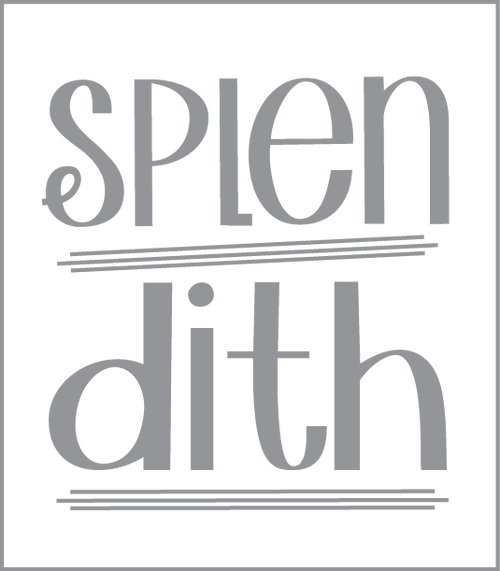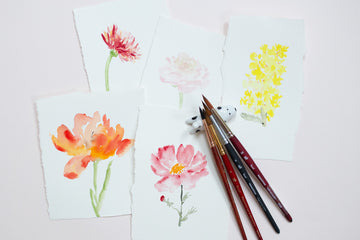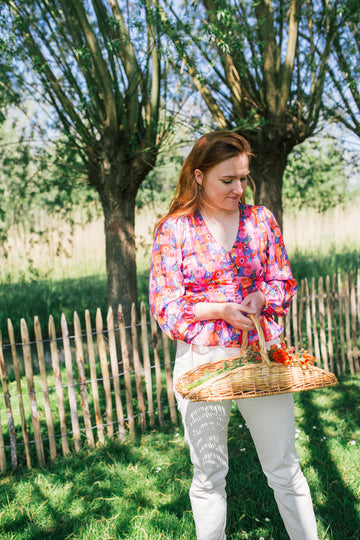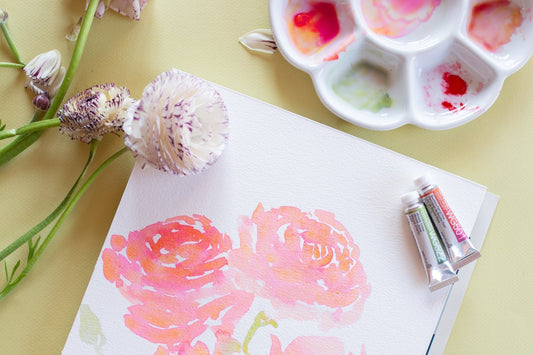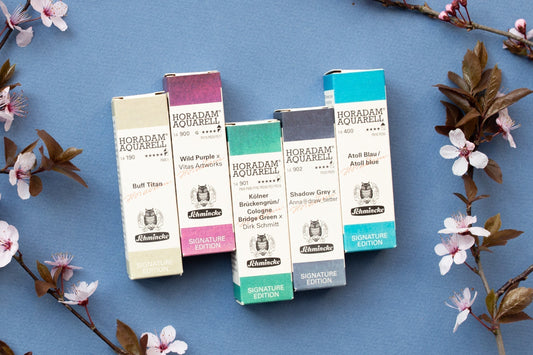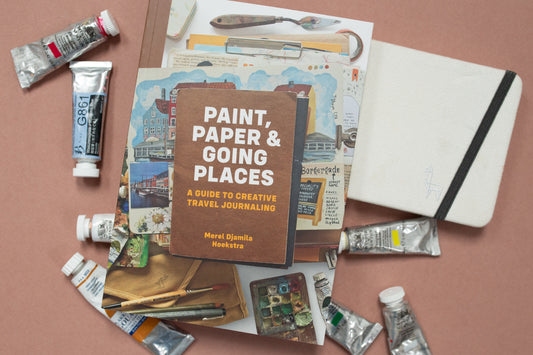I am regularly asked: 'I want to paint with watercolor (or another material): which brush is best for that?' In this blog I try to advise you step by step on a brush that suits the materials you like to use.
Budget
Well, let's start right away ;). Your budget obviously plays a role in your choice. We recommend purchasing as few brush sizes as possible, in the best quality you can afford . Brushes last a long time, so it's worth spending a little more on them. Start smaller: think about 2-3 sizes of round brushes to start with. Check which size you plan to use and what the total price is.
What material do you mainly use?
Before you choose which brush, it is important that you know what kind of material you usually use or want to use. Is this watercolor, is this acrylic or gouache, for example? Each paint has a different composition of density and weight. The brushes are optimally tailored to that composition, it is important that your choice matches the material.
Each brush is rated in: stiffness, watercolor, acrylic and oil paint. In the assessment, a brush receives a maximum of five stars. For example, 3/5 is three out of five stars. 1/5 for stiffness means a very soft brush. 5/5 for watercolor means very suitable for watercolor.
Mixed media or specific to one material?
In the shop you can choose from three categories: mixed media, watercolor or acrylic brushes. Here is a brief summary:
Mixed media brushes
You can use this type of brush for different types of materials. Handy if you often use different materials! It is important to consider: a mixed media brush is a good all-rounder, but cannot excel with all materials.

Princeton Select & Princeton Snap are both student versions Mixed media brushes. If you want a good budget-friendly solution, then these are certainly nice brushes. The Select brushes are suitable for slightly more materials and are available in more sizes and shapes.
Princeton Select: Stiffness: 3/5 - Watercolor: 4/5 - Acrylic: 5/5 - Oil: 2/5
Princeton Snap: Stiffness: 3/5 - Watercolor: 4/5 - Acrylic: 4/5 - Oil: 2/5

Princeton Velvetouch are artist quality mixed media brushes. Due to the beautiful quality, it is also very suitable for watercolor and acrylic. The difference in quality is mainly noticeable in the type of hair and the amount of hair. They absorb paint and water a little easier than the student versions.
Stiffness: 3/5 - Watercolor: 4/5 - Acrylic: 5/5 - Oil: 2/5
Watercolor brushes
A brief summary of our watercolor brushes, these are all artist quality brushes.

Princeton Heritage: These are our most popular watercolor brushes. The hairs fan out easily, but also bounce back very easily at the tip. They are soft enough, but also have a good and sharp point.
Stiffness: 3/5 - Watercolor: 5/5 - Acrylic: 2/5 - Oil: 0/5

Princeton Elite : Similar to Heritage but slightly softer. The belly of the round brushes is slightly more convex, making the shape more similar to a sable brush.
Stiffness: 2/5 - Watercolor: 5/5 - Acrylic: 0/5 - Oil: 2/5

Princeton Neptune Brushes: these are the soft watercolor brushes. The hairs blow out very softly, but spring back into shape less easily.
Stiffness: 1/5 - Watercolor: 5/5 - Acrylic: 0/5 - Oil: 0/5
You can use multiple types of brushes
We obviously don't want to make it more difficult for you, but hopefully this will make it easier for you. Just as you can use different brands of paint together, you can also use different types of brushes together. Would you like to test different brushes or do you need different properties? Then you can always choose to buy a different size of each type of brush you are unsure about.
My advice for specific materials:
Are you going to use watercolor paint?
With watercolor you want the brushes to hold the water well and gradually release it onto the paper. Watercolor is light and easily transportable paint, so the bristles could be a little softer: the paint is less likely to influence the shape of the brush.
For watercolor I recommend: Princeton Select (budget) Heritage (favorite), Elite as a successor, Neptune as a soft variant.
Are you going to use gouache?
Gouache is a lot heavier than watercolor paint. The weight can affect the shape of your brush if the bristles are not strong enough. Gouache, however, is a questionable case. Do you dilute the gouache very much with water? Then I would choose a sturdier watercolor brush. Do you use the gouache almost straight from the tube? Then choose a mixed media brush.
For diluted gouache I recommend: Select (student), Heritage (favorite/pro) Elite.
For both diluted and thicker gouache I recommend a mixed media brush: Select (student) Velvetouch (pro)
It is better not to use Neptune, these bristles are too soft.
Are you going to work with acrylic?
For use with acrylic I recommend mixed media brushes: Select (student) Velvetouch (pro) Do not use Neptune, these bristles are too soft.
Do you use acrylic gouache very diluted with water? Then you can possibly use the advice of the gouache.
Is it not completely clear to you yet? You can always email or call us for appropriate advice.
Love,
Judith
Ps: If you have never used brushes before, read the blog ' what is a good brush '. Because when you know more about brushes, you can make a choice more easily.
